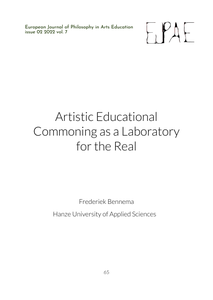This article presents and discusses an extracurricular, co-constructed programme: “The Catalyst Club” as a form of Artistic Educational Commoning (AEC). Having been developed as part of a PhD research at Minerva Art Academy (Groningen, TheNetherlands), The Catalyst Club (TCC) explored new perspectives on the education of artists and designers in a globalized world and created alternative modes of operating in higher art education. It brought together students, alumni, teachers from a range of disciplines, and external participants. During developing TCC, the author occupied a dual role as researcher and participant, working together with others in an artistic co-creative process. TCC drew on and developed the methods relating to Collaborative Autoethnography, Participatory Action Research and Artistic Research. This study presents AEC as a communal effort to build spaces for learning and experimentation. They are created through interaction and cooperation, based on social relations and the production of shared values. As such it can offer a counterbalance to the extensive individualisation, instrumentalization, and commodification of communities in higher art education. The article formulates some recommendations on how AEC can reconnect the education of artists and designers with the role of the arts in wider technological, societal, and political contexts.

Due to considerable occupational challenges and stressors, classical musicians might face increased risk for mental health issues, compared to the general population. As such, scholars have highlighted the importance of developing psychological resilience in musicians. Nevertheless, this important psychological characteristic has remained understudied within music psychology. The present study therefore examined the relationship between mental health issues and resilience. Using a cross-sectional survey design, a total of 64 musicians (including both music students and professionals) participated in this study. Results highlight that symptoms of depression/anxiety were relatively high within the current population. Moreover, music students experienced significantly more symptoms compared to professional musicians. Both resilience and general physical health were found to be negatively associated with mental health issues. The results highlight the need for further research into mental health issues in music students and provide preliminary evidence for the importance of psychological resilience in classical musicians.
